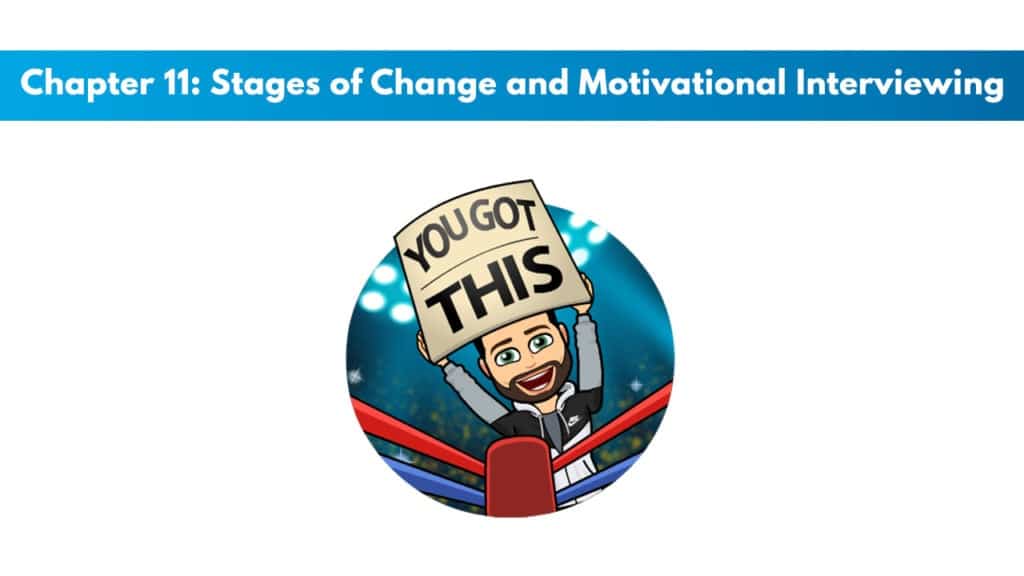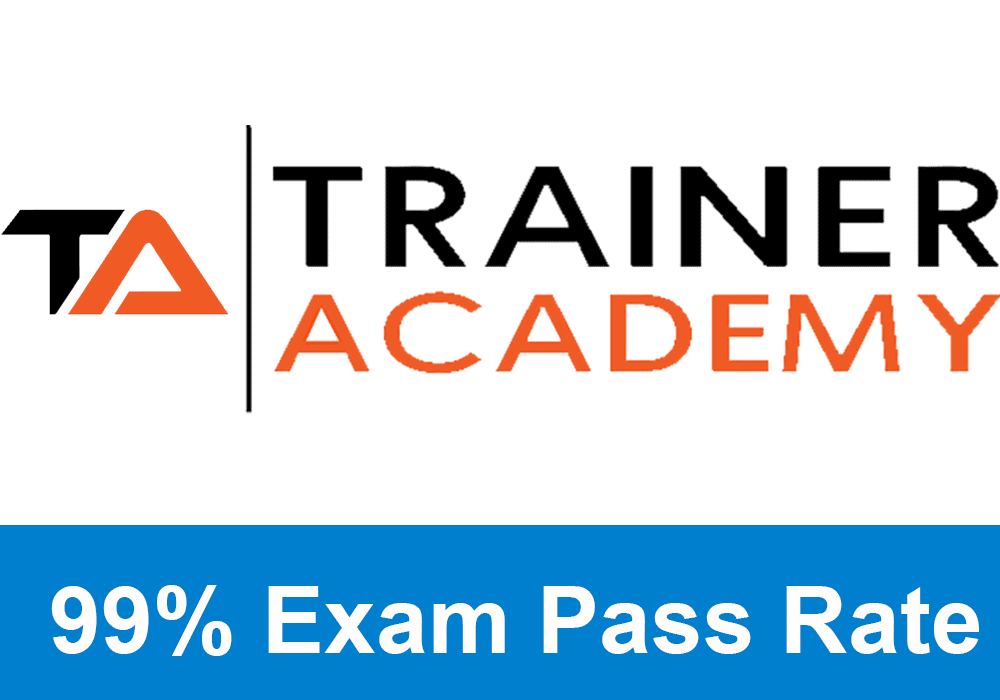
If you have not yet signed up for the ISSA Nutritionist certification, you can get it here for free as part of a special bundle.
Get your copy of the ISSA Nutritionist exam cheat sheet. It helps immensely in studying for the exam.
My PTP students report cutting their ISSA Nutritionist study time and effort in half with Trainer Academy.
Benefit from the Exam Pass Guarantee and Retake Fee Guarantee. Plus, take advantage of my current discount code PTPJULY for 50% off the MVP Program (Ends July 16th, 2025).
Try it out for free here to see if it’s right for you, or read my detailed review for further insights.
Chapter Goals:
- Know the five stages of change.
- Be able to discuss the three aspects of motivation.
- Be able to discuss motivational interviewing and how it can be used for nutrition coaches.
- Find the strategies that make motivational interviewing more effective.
Introduction
Making changes or adjustments to behaviors or lifestyle patterns can be a difficult task for someone to do, as every person goes through the process in their own time and they have their own form of setbacks and successes.
The stages of change, which was briefly touched on in the last chapter, work to define the general steps that lead to someone actually going through with their changing of behaviors.
The stages of change model describes the thoughts, feelings, and behaviors of people in the processes of change.
The motivation of someone can detail their reasons for their behavior in specific ways.
The Stages of Change Model
This model is going to put people in behavior change stages that reflect where someone is at a given time, and it recognizes the following factors as needed for modifying behavior.
Increased awareness for the decisional balance.
Self-efficacy and autonomy the ability for people to act independently and make choices.
Strategies for making and keeping a behavior change.
Exclusive PTP CPT Offers |
||
|---|---|---|
Most Popular Cert | Best Online NCCA Cert | Best Study Materials |
Gold Standard Cert | A Good Option | Best CPT for you?  |
The stages are these five:
Precontemplation
The pre-contemplation stage has the client with no intention of addressing a behavior.
Changes here will need to be achieved by shifting a client’s perception of the change. This involves raising confidence, rating the ability to change, finding the possible barriers in their life, and deciding what makes it all seem difficult.
Contemplation
The contemplation stage is when the client is aware of the need for change but have barriers to overcoming it.
The client is slightly thinking about changing and may need more of a push or some help defeating some of the remaining barriers left for their progress.
Preparation
The preparation stage is when someone has the desire to change, but they are also seeking a way to do it.
This has the person ready to change, and it’s a vital time not to overwhelm and defeat the client but to prepare them and allow them to play a part in deciding everything they are going to do in their changes for their behavior.
Action
The action stage is when someone is taking the needed steps to address their own behaviors and change them.
This is marked by being in the plan of action stage for less than 6 months usually. The 6-month mark is actually where the next stage is going to take place.
Maintenance
Exclusive PTP CPT Offers |
||
|---|---|---|
Most Popular Cert | Best Online NCCA Cert | Best Study Materials |
Gold Standard Cert | A Good Option | Best CPT for you?  |
The maintenance stage is when someone continues to do what is needed for them to keep going with their desired behavior.
This is marked by being in the action of trying to change behaviors and such for 6 months of time.
Determining Motivation
The language used by clients in their question answering can give the coaches some valuable data and insight when the coach is trying to establish their motivation.
Open-ended questions are helpful for us to utilize and expand the conversation about change and help to reveal the stage of change that the client might be in.
Some more specific questions to uncover the stage of change and motivation could be things like:
- What thoughts do you have about making this change?
- Is there anything specific that motivated you to make a change?
- How would you describe the benefits of making a change?
- What would you say are the costs of said changes?
- Use various scales to describe confidence and changes.
The Elements of Motivation
Motivation is the reason people do the things that they do, and it is made up of three things: autonomy, mastery, and purpose.
Autonomy
This describes the ability to govern oneself and the capacity to act and follow the objective guidelines instead of being simply influenced by desires and whims.
The relationship between autonomy and motivation is related strongly. When autonomy increases, so does motivation, and the same is true the other way. As autonomy diminishes, so does the motivation.
Mastery
This describes the state of having total understanding and knowledge of a subject or situation. When someone thinks they are educated, confidence is going to go up and successful behavior modification and maintenance can be achieved.
Like autonomy, mastery stands on a sliding scale and constantly changes. As mastery goes down, research shows that there is a deleterious effect on motivation.
Purpose
This is a person’s own goals or fixed intentions, and it ties with motivation. Everyone has their own reason for doing something like making a change. Nutrition coaches should dig deep enough to find the client’s purpose and unlock the true motivations and better progress in the behavior modification.
It is good to know that a sense of purpose increases means that motivation also increases, and the same relationship exists in the negative.
Motivational Interviewing
The motivational interviewing model is widely accepted to elicit the behavior change. The model works on facilitating and engaging intrinsic motivation to change behavior.
The premise of motivational interviewing is that all people have desires for self-actualization and that, through free choice and unconditional acceptance, they will seek to realize that potential.
Motivational interviewing is based on these assumptions:
- All people have the capacity and desire for self-actualization.
- The power to change is in the client.
- Ambivalence is a normal aspect of change that becomes a motivational obstacle in the change process.
- Ambivalence can be overcome through the coach-client alliance as a partnership with collaboration that incorporates expertise of both people.
Motivational interviewing is guided through five different principles:
- Express empathy to the client with reflective listening
- Discover ambivalence
- Avoid arguing and confrontation that is direct
- Be able to adjust the client’s resistance instead of opposing it directly
- Support the client with encouragement and optimism.
Express Empathy
Empathy is a learnable skill for understanding someone’s meaning through the use of reflective listening. Someone with an empathetic style does these things:
- Communicates respect for and acceptance of clients and their feelings.
- Sincerely compliments instead of trying to gain an advantage by belittling the client and their efforts.
- Listens instead of telling.
- Gently persuades and makes sure that the decision to change is understood.
- Provides support through every part of the client’s program to change their life and body through the use of supportive comments.
Some barriers that are common for effective listening are:
- Ordering and directing.
- Warning or threatening.
- Giving advice, making suggestions, or providing too early when solicited.
- Persuading with logic, arguing, or lecturing.
- Moralizing, preaching, or telling clients their duty.
- Judging, criticizing, disagreeing, or blaming.
- Agreeing, approving, or praising.
- Shaming, ridiculing, labeling, or name-calling.
- Interpreting or analyzing.
- Reassuring, sympathizing, or consoling.
- Questioning or probing.
- Withdrawing, distracting, humoring, or changing the subject.
Uncover Ambivalence
The goal here is to create a discrepancy between what a person is currently doing and where they would like to be.
Ambivalence is the difference between the client who stands in front of a coach in the gym ready to make healthy changes in their life and the client who later goes home, may feel overwhelmed, doubts themselves, and acts on their own impulses that are not aligned with their goals.
Avoid Argument
Clients that may be hostile, provocative, and defiant can be quite frustrating. A main principle of motivational interviewing is to avoid arguments.
If you try to convince a client that there is a problem or some change is needed, it can bring even more resistance.
A common successful position is to have the client voice their own arguments for change instead of having the professional tell them.
Avoid Resistance
Client resistance is a normal reaction, and every client will have some challenges that need their time and energy to overcome.
There are seven strategies that nutrition coaches should use to deal with client resistance.
- Simple reflection
- Amplified reflection
- Double-sided reflection
- Shifting focus
- Agreement with a twist
- Reframing
- Siding with the negative
Support Clients with Optimism and Enthusiasm
Many clients do not believe they have the power to make changes that last in their lives.
Motivational Interviewing Strategies
- Strategy 1: Ask Open-ended questions
- Strategy 2: Listen Reflectively
- Strategy 3: Summarize
- Strategy 4: Affirm and Validate
- Strategy 5: Uncovering and Addressing Ambivalence

 Have a question?
Have a question? 



Tyler Read
PTPioneer Editorial Integrity
All content published on PTPioneer is checked and reviewed extensively by our staff of experienced personal trainers, nutrition coaches, and other Fitness Experts. This is to make sure that the content you are reading is fact-checked for accuracy, contains up-to-date information, and is relevant. We only add trustworthy citations that you can find at the bottom of each article. You can read more about our editorial integrity here.